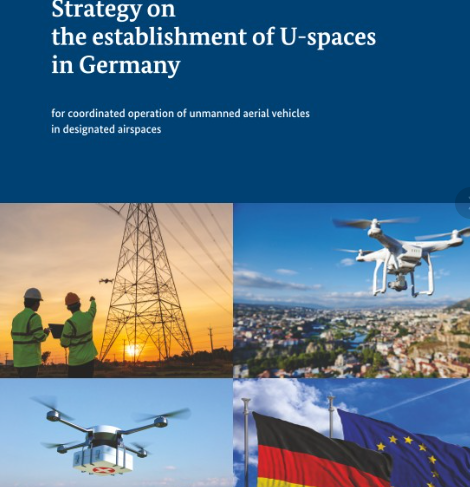The Federal Ministry for Digital and Transport (BMDV) has published a U-space Strategy aimed at improving the integration of drone traffic into the existing airspace. The strategy provides the basis for the first U-space act, which is due to be developed in 2023.
The German U-space Strategy envisages a single Common Information Service Provider (sCISP) and recommends that the Federal Supervisory Authority for Air Navigation Services (BAF) should be responsible for certifying the sCISP and the U-space Service Providers (USSPs).
The U-space Strategy is designed to ensure safe and secure integration of unmanned aviation into existing airspace structures in accordance with European regulations. The aim is to allow delivery, inspection and supply drones to use the same airspace as, for instance, emergency helicopters, gliders or passenger aircraft.
The strategy provides guidance for a bill for the establishment of U-spaces in Germany, scheduled for 2023. It was developed by the Federal Government, the federal states, aviation authorities, the Drones Advisory Council and others. The findings of the U-space real-world laboratory in Hamburg, which was funded by the Federal Ministry for Digital and Transport, were also integrated in the strategy. The U-space Strategy helps define responsibilities, necessary structures and the procedure for the designation of U-spaces in accordance with Implementing Regulation (EU) 2021/664.
A U-space coordinator will be established either at the BMDV or one of its executive agencies. He or she will decide where to establish U-spaces in coordination with the relevant federal state or local authorities. U-spaces are to be designated in metropolitan areas, since there is a lot of manned and unmanned air traffic. They will be limited in space to the extent that is necessary for planned operations.
Rhineland U-space real-world laboratory funding project
The BMDV is providing about 1.8 million euros in funding for a U-space real-world laboratory in the Rhineland to already start exploring the future possibilities of U-spaces now. Federal Minister Wissing issued notices of funding today at the BMDV to representatives of the four project partners, RWTH Aachen, flyXdrive GmbH, Vodafone GmbH and Droniq GmbH. The research project aims at gaining insights from the practical use of drones for their safe integration into the airspace, with a special focus on 5G connectivity for the interconnection of aviation. To this end, various flight scenarios will be performed in the real-world laboratory to trial the functioning of U-space services and find out which requirements have to be met by 5G connectivity. The project will run until January of 2025. The findings will be provided as recommendations for action and taken into account in the legislative procedure.
For more information visit:




